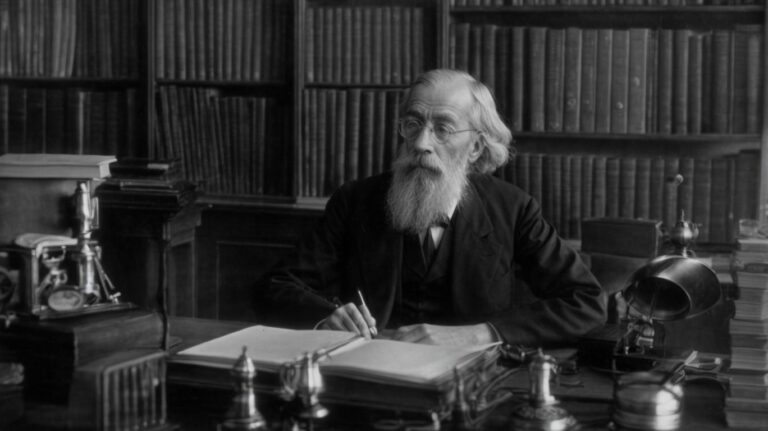Margaret Floy Washburn, a pioneering figure in the field of psychology, made significant contributions that continue to influence the discipline to this day. From her groundbreaking research in animal behavior to her groundbreaking work on the motor theory of perception, Washburn’s impact on psychology is undeniable.
In this article, we will delve into Washburn’s major contributions, explore how her work shaped the field of psychology, and examine some criticisms of her research. We will discuss Washburn’s legacy as the first woman to receive a PhD in psychology and her continued influence on the study of perception, cognition, and animal behavior.
Contents
- 1 Who is Margaret Floy Washburn?
- 2 What are her Major Contributions to Psychology?
- 3 How did Washburn’s Work Influence the Field of Psychology?
- 4 What are Some Criticisms of Washburn’s Work?
- 5 What is Washburn’s Legacy in Psychology?
- 6 Frequently Asked Questions
- 6.1 Who is Margaret Floy Washburn and what were her contributions to psychology?
- 6.2 What are some of Margaret Floy Washburn’s most significant research findings?
- 6.3 How did Margaret Floy Washburn’s work on consciousness impact the field of psychology?
- 6.4 What obstacles did Margaret Floy Washburn face as a woman in the field of psychology?
- 6.5 In what ways did Margaret Floy Washburn contribute to the establishment of psychology as a respected discipline?
- 6.6 What is Margaret Floy Washburn’s legacy in the field of psychology?
Who is Margaret Floy Washburn?
Margaret Floy Washburn, a prominent psychologist, was the first woman to receive a PhD in psychology, paving the way for women in the field.
Washburn’s academic journey began at Vassar College, where she studied philosophy and psychology. She later pursued her graduate studies at Cornell University under the guidance of E. B. Titchener, a renowned experimental psychologist. Washburn’s research focused on animal behavior and perception, leading to groundbreaking contributions in the field of comparative psychology. Her most notable work, ‘The Animal Mind,’ explored the complex inner workings of animal cognition, setting a foundation for future studies in the area.
What are her Major Contributions to Psychology?
Margaret Floy Washburn made significant contributions to psychology, particularly in the realms of animal behavior, motor theory, and understanding mental processes.
Washburn’s research areas extended beyond her groundbreaking work in these fields, looking into the intricate workings of animal behavior, sensory perception, emotions, and mental processes.
Her studies on animal behavior revealed fascinating insights into the complexities of their interactions, communication methods, and cognitive abilities. Through her experimental studies and theoretical frameworks, Washburn shed light on the interconnectedness between emotions and cognitive processes, laying the foundation for future research in these areas.
Animal Behavior Research
Washburn’s research in animal behavior was groundbreaking, looking into comparative psychology and pioneering experimental work to understand behavioral patterns.
Her innovative studies focused on exploring the cognitive abilities of animals such as rats, monkeys, and pigeons, shedding light on their problem-solving skills and social interactions. This led to significant discoveries that challenged previous beliefs about intelligence and emotions in non-human species.
Through meticulous observation and controlled experiments, Washburn identified complex behaviors and communication mechanisms, paving the way for a more nuanced understanding of animal cognition.
The Motor Theory of Perception
Washburn’s motor theory of perception revolutionized the understanding of how movements and sensory perception interact to shape cognitive processes.
Proposed in the early 20th century by H.W. Washburn, this theory highlighted the inseparable connection between bodily movements and sensory experiences in interpreting the world around us. It suggested that perception involves more than just passive reception of stimuli but is an active process driven by continuous feedback loops between our sensory systems and motor responses. These feedback loops play a crucial role in not only perception but also in coordinating movements and integrating sensory information into coherent cognitive functions.
The Mental Development of the Dog
Washburn’s research on the mental development of dogs shed light on cognitive processes, behaviors, and memory, contributing to the understanding of cognitive development.
Her studies delved into the intricate workings of dog cognition, exploring how these furry companions process information, form memories, and exhibit behaviors reflective of their mental abilities. Through meticulous observation and experimentation, Washburn unearthed fascinating insights into the complexity of dogs’ cognitive capabilities.
Her groundbreaking experiments revealed how dogs navigate spatial challenges, remember past events, and display emotional responses that hinted at a deeper understanding of their surroundings. By meticulously documenting their learning processes and cognitive adaptations, Washburn provided significant contributions to the field of animal psychology.
How did Washburn’s Work Influence the Field of Psychology?
Washburn’s work had a profound influence on the field of psychology, shaping research on relationships, social consciousness, and the interplay between individuals and their environments.
Her groundbreaking studies not only helped in understanding the dynamics of relationships but also played a significant role in fostering social consciousness within the discipline. By looking into the complexities of how individuals interact with their environments, Washburn provided invaluable insights that laid the foundation for many psychological theories and paradigms.
Advancements in Animal Behavior Studies
Washburn’s advancements in animal behavior studies led to new insights through rigorous experimental studies, expanding the understanding of behavioral patterns in various species.
Through meticulously designed experiments, she delved into the complexities of animal communication, social hierarchies, and mating behaviors. By utilizing innovative observational techniques and controlled environments, Washburn illuminated the intricate dynamics of animal interactions. Her findings not only revealed the nuances of species-specific behaviors but also challenged prevailing beliefs about cognitive abilities in non-human creatures. The systematic approach employed in her research set a benchmark for future studies in the field, shaping the trajectory of animal behavior research for generations to come.
Impact on Perception and Cognition Research
Washburn’s work had a lasting impact on perception and cognition research, elucidating the role of movements in shaping sensory perception and cognitive processes.
Her pioneering studies delved deep into how motor actions, such as body movements and gestures, are intricately linked to how we perceive the world and make sense of complex cognitive tasks.
By exploring the connections between physical movements and mental processes, Washburn revolutionized the field, paving the way for further research on embodied cognition and the interplay between body and mind.
Influence on Developmental Psychology
Washburn’s influence on developmental psychology extended to understanding cognitive development, providing valuable insights into the progression of mental processes from infancy to adulthood.
Her groundbreaking research delved into the intricacies of how individuals acquire knowledge, problem-solve, and process information across different stages of life. Washburn’s contributions paved the way for a deeper comprehension of developmental milestones and the factors influencing cognitive growth.
Through her studies, she highlighted the significance of social interactions, environmental influences, and genetic predispositions in shaping intellectual maturation. This multidimensional approach revolutionized the field of psychological growth and set the stage for further exploration into the complexities of human cognition.
What are Some Criticisms of Washburn’s Work?
Despite her achievements, Washburn faced criticisms for her limited research on human behavior and the lack of diversity in her participant selection.
These criticisms underscore the importance of inclusive and diverse research practices in understanding the complexities of human behavior. Scholars argue that by solely focusing on non-human subjects, Washburn may have missed crucial nuances that are unique to human interactions and behaviors. The lack of diversity in participant selection can lead to skewed results, limiting the generalizability of her findings. Some critics suggest that a more holistic approach, encompassing a wider range of participants and behaviors, could have strengthened the validity and applicability of Washburn’s research.
Limited Research on Human Behavior
Critics pointed out Washburn’s limited research on human behavior, highlighting the need for more comprehensive experimental studies in this area.
Some critics argue that Washburn’s focus on animal research and the subjective nature of introspection limited her contributions to a deeper understanding of human behavior.
They suggest that incorporating quantitative methods and large-scale studies could strengthen the reliability and generalizability of findings in psychology.
Critics emphasize the importance of considering the socio-cultural factors that influence behavior, calling for more diverse samples and interdisciplinary collaborations in research.
Lack of Diversity in Participants
Washburn’s work was criticized for the lack of diversity in her participant selection, particularly concerning the representation of women and the educational backgrounds of research subjects.
This criticism highlighted the significant underrepresentation of women in Washburn’s studies, which raised concerns about the generalizability of her research findings. The educational biases in participant selection were seen as limiting the scope and applicability of the research outcomes. Critics argued that Washburn’s failure to include a more diverse set of participants not only compromised the validity of her studies but also perpetuated existing gender and educational biases within the field.
What is Washburn’s Legacy in Psychology?
Margaret Floy Washburn’s legacy in psychology endures as she became the first woman to receive a PhD in psychology and was later elected to the National Academy of Sciences.
Her groundbreaking work paved the way for future generations of female psychologists and established her as a trailblazer in the field. Washburn’s studies on animal behavior, particularly her research on the motor theory of consciousness, solidified her reputation as a respected scholar and thinker.
Her induction into the National Academy of Sciences underscored the significance of her contributions to the scientific community, and she remains a symbol of give the power toment and accomplishment for women in academia.
First Woman to Receive a PhD in Psychology
Washburn made history as the first woman to achieve a PhD in psychology, breaking barriers for women in academia and the field of psychology.
Her groundbreaking accomplishment paved the way for countless women aspiring to pursue higher education and challenging traditionally male-dominated fields.
Her determination and intelligence defied societal norms of the time, inspiring a generation of female scholars to strive for excellence.
Washburn’s success not only elevated her own academic career but also served as a beacon of hope for future generations of women seeking equal opportunities in the academic realm.
Pioneering Role for Women in Psychology
Washburn’s pioneering role paved the way for women in psychology, inspiring future generations and contributing to the recognition of women’s achievements in the American Psychological Association.
Her leadership in education highlighted the importance of including diverse perspectives in academic settings, leading to a more inclusive and holistic approach to psychological studies. Washburn’s advocacy for women’s participation in research reshaped the landscape of psychological inquiry, fostering a more gender-balanced and representative field. Her influence extended beyond academia, shaping the very foundation of the American Psychological Association and championing equal opportunities for women professionals in the field.
Continued Influence on Animal Behavior Studies
Washburn’s influence continues to resonate in animal behavior studies, inspiring researchers to delve into experimental work and behavioral analysis in diverse species.
One of Washburn’s most notable contributions lies in her innovative experimental methodologies, which emphasized the importance of empirical data in understanding animal behavior. Through meticulous observation and controlled experiments, she paved the way for modern behavioral analysis techniques. Her studies on cognitive abilities and social interactions in animals provided key insights into the complex nature of behavior across different species.
Washburn’s enduring legacy extends beyond her own research, as her groundbreaking work continues to shape the way researchers approach animal behavior studies today. By combining rigorous scientific methods with a deep respect for animal welfare, she set a precedent for ethical and insightful research practices in the field.
Contributions to the Understanding of Perception and Cognition
Washburn’s contributions to understanding perception and cognition have shaped the field, offering insights into consciousness, cognitive processes, and the interplay between sensory perception and mental functions.
She delved deep into how human perception processes external stimuli and converts them into meaningful experiences within the mind. Washburn’s pioneering work shed light on the complexities of conscious awareness and how it influences our behavior and decision-making. Her research laid the groundwork for modern studies on cognitive psychology and neural mechanisms underlying sensory perception. Through her meticulous experiments and observations, Washburn provided a framework for understanding the intricate connections between the brain and perceptual experiences.
Frequently Asked Questions
Who is Margaret Floy Washburn and what were her contributions to psychology?
Margaret Floy Washburn was the first woman to earn a PhD in psychology in the United States. Her contributions to psychology include her influential research on animal behavior, theories on consciousness, and her role in establishing psychology as a respected discipline.
What are some of Margaret Floy Washburn’s most significant research findings?
Washburn’s research on animal behavior led to groundbreaking insights on the relationship between behavior and consciousness. She also conducted important studies on the psychology of vision and perception, and her work on motor learning helped shape modern theories on skill acquisition.
How did Margaret Floy Washburn’s work on consciousness impact the field of psychology?
Washburn’s theories on consciousness challenged traditional views and helped pave the way for modern cognitive psychology. Her work also influenced the development of Gestalt psychology and the study of mental processes.
What obstacles did Margaret Floy Washburn face as a woman in the field of psychology?
Despite her groundbreaking achievements, Washburn faced considerable discrimination and was often denied recognition for her work due to her gender. She also faced challenges in obtaining academic positions and faced resistance from male colleagues who did not believe women were fit for academic work.
In what ways did Margaret Floy Washburn contribute to the establishment of psychology as a respected discipline?
Washburn’s research and advocacy for the scientific study of behavior and mental processes helped establish psychology as a legitimate field of study. As the first woman to receive a PhD in psychology, she also paved the way for other women to enter the field and make important contributions.
What is Margaret Floy Washburn’s legacy in the field of psychology?
Margaret Floy Washburn’s legacy includes her groundbreaking research, her role in establishing psychology as a respected discipline, and her inspiring trailblazing accomplishments as a woman in academia. Her work continues to influence and shape the field of psychology today.




